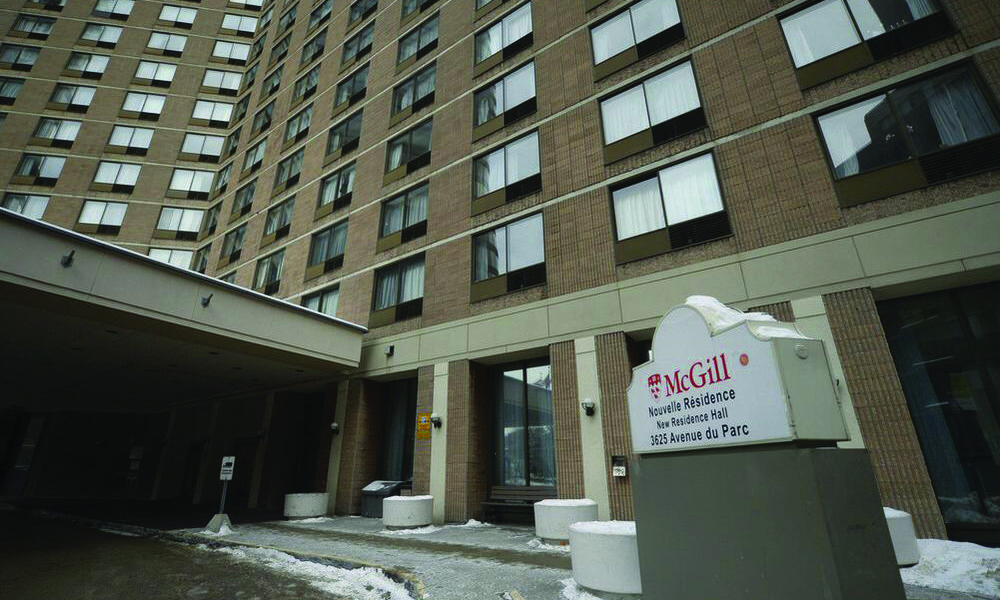Between March 20 and 26, McGill reported 473 COVID-19 cases on campus, an increase of 330 from the previous week. Along with the rise in cases, many preventative measures are being lifted by both the Quebec government and McGill. After the province disabled the vaccine passport application, McGill announced it would drop vaccine passports at McGill starting March 28, and that all in person final exams would go ahead as scheduled. Starting April 1, McGill will also be consolidating rapid testing in residences into a single site at Carrefour Sherbrooke. Previously, there were four sites—Carrefour Sherbrooke, New Residence Hall, McConnell Hall, and Macdonald Campus Laird Hall—and rapid testing was only available for symptomatic students living in residence.
On the McGill subreddit, students and floor fellows living in residences have expressed concern regarding the sudden increase in cases and the lack of preventative action taken by the university. Christian Tonnesen, vice-president floor fellow, suspects that the number of cases reported by McGill is not representative of the actual number of COVID-19 cases within the campus community, noting that students often do not inform McGill of their positive test results.
“I have had many floor fellows approach me and let me know that they suspect, and/or have often been told, that a majority of their students have COVID-19, or have been in close contact with someone who does have it,” Tonnesen wrote in an email to The McGill Tribune. “It strikes me as ironic that for an institution that was very hardline on COVID-19 and took many precautions regarding isolating students and relocating them last year, to have them throw up their hands and say, ‘Welp, we tried, but there are not enough rooms. Good luck everyone.’”
Nina McConnell, a U1 Economics student living in New Residence, approves of McGill’s management of the new wave. For her, tight restrictions at the start of the year, like visitor limits, made socializing difficult and felt arbitrary at times.
“I appreciate the loosening up of the restrictions even despite what’s going on,” McConnell said. “There was a period when it was a little scary when they were out of isolation rooms in residence, but other than that I think they’ve been handling it pretty well. We still need to mask, we still go down to the dining hall and are distanced. But I think, overall, it’s better to manage it this way than to have the extremely tight restrictions that were happening at the beginning of the year when there were less cases.”
Dr. Anne Gatignol, a professor in the Department of Medicine at McGill, believes that loosening restrictions will increase contamination, which she believes is inevitable at some point. Nevertheless, given that so many students have been contracting COVID-19, Gatignol encourages students to take precautions to protect themselves against the new variant and other respiratory infections.
“If you remove the mask, you increase the circulation of all respiratory viruses, and we already see an increase in flu and colds due to many other viruses,” Gatignol said. “As SARS-CoV2 Omicron BA.2 variant circulates and is more contagious than the original Omicron, it would be much better to keep masks on most of the time when distancing is not possible. It would protect against COVID, but also against the flu and other respiratory infections.”
Frédérique Mazérolle, media relations officer at McGill, wrote to the Tribune that McGill had revised its protocols in residence to support student safety in light of the recent spike in COVID-19 cases in Quebec. She explained that appropriate measures will remain in place, and that McGill will remain vigilant as the pandemic evolves.
“We urge students that test positive to continue isolating in their rooms and to report their test results to the McGill Case Management group. In the event that our self-isolation rooms reach capacity, and in order to accommodate all students in residence, a new room may be temporarily assigned if necessary,” Mazérolle wrote. “If there is increased demand in the future for rapid testing in residences, we will ensure that testing is ramped up to meet capacity.”
Tonnesen believes that the current measures McGill has implemented to tackle the surge are insufficient. As a result, he explained, floor fellows have had to work with students to create their own COVID-19 safety measures as best as they can.
“Since McGill is failing to act, there are groups of students and floor fellows in residences with shared bathrooms who have had to do the work McGill hasn’t, such as creating ‘COVID’ and ‘NON-COVID’ sinks and bathrooms in residences with shared facilities or organizing food delivery,” Tonnesen wrote. “If I didn’t know any better, I’d say McGill has weighed the pros and cons and decided that the COVID disaster in residence will hopefully pass with minimal media coverage and is therefore not worth the financial cost of ensuring the bare minimum safety requirements for students and floor fellows.”









Pingback: Protecting disability rights is the only way forward - The McGill Tribune